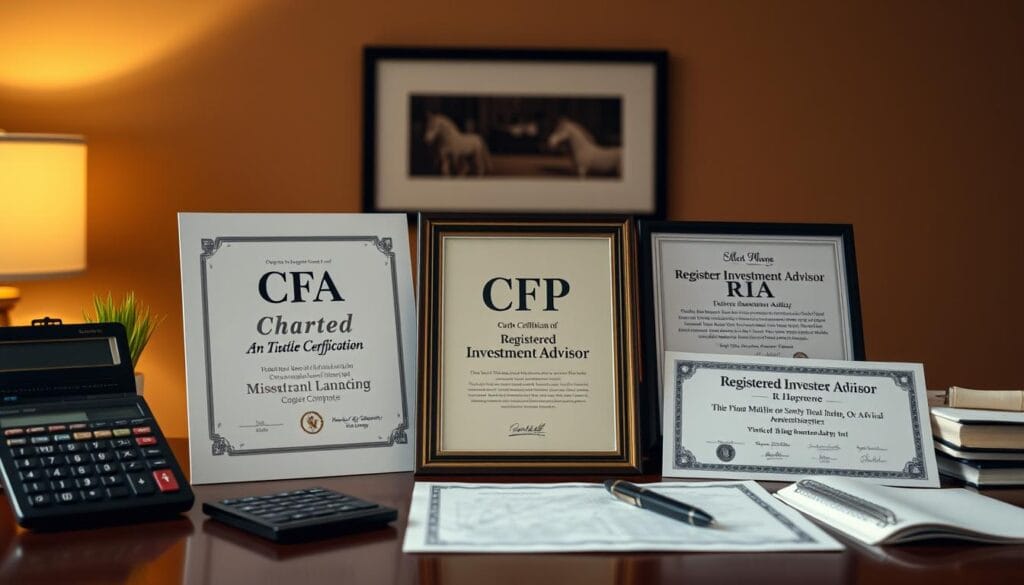Nearly 1 in 5 retirees face the challenge of making their savings last throughout their retirement years, according to a recent study. Effective retirement planning is crucial to ensure financial security.
A trusted financial advisor can provide personalized guidance, helping retirees navigate complex financial decisions. Local experts offer face-to-face interactions, valuable for those requiring tailored advice on managing retirement assets.
Key Takeaways
- Retirees benefit from specialized financial planning tailored to their unique situation.
- Local financial advisors provide valuable knowledge about regional economic conditions.
- Understanding qualifications, fee structures, and the selection process is crucial.
- Retirees can gain peace of mind with a trusted financial advisor.
- Essential services include retirement income planning and investment management.
Why Retirees Need Specialized Financial Guidance

Retirees face a new financial landscape that demands tailored advice and planning. Retirement represents a fundamental shift in financial strategy, from accumulation to distribution, requiring specialized knowledge and planning approaches that differ from pre-retirement financial management.
Retirees encounter unique challenges, including managing fixed incomes, navigating required minimum distributions, and planning for healthcare costs. According to research, retirees working with financial advisors report greater confidence in their retirement planning and financial security.
- Managing longevity risk—the possibility of outliving one’s assets—requires sophisticated retirement planning strategies.
- Specialized financial advisors understand the emotional aspects of retirement transitions and provide guidance on both financial and lifestyle considerations.
| Challenges in Retirement | Specialized Guidance |
|---|---|
| Managing fixed incomes | Customized investment strategies |
| Required minimum distributions | Tax planning and optimization |
| Healthcare costs planning | Long-term care planning and insurance |
By working with a financial advisor, retirees can ensure their assets last throughout retirement, addressing their unique needs and enhancing their financial security.
The Value of Working with a Local Investment Advisor

Working with a local investment advisor can be a game-changer for retirees seeking personalized financial guidance. Local investment advisors offer several benefits, including:
- Personalized face-to-face interactions that build stronger relationships and trust, particularly important for retirees making significant financial decisions.
- Deeper knowledge of regional economic conditions, state-specific tax laws, and local retirement communities that can benefit your wealth management strategy.
- The convenience of in-person meetings, preferred by many retirees when discussing complex financial planning topics or reviewing investment management performance.
- Greater accessibility during market volatility or personal financial emergencies, providing timely reassurance and guidance.
- Established professional networks with local attorneys, CPAs, and insurance specialists, creating a more coordinated approach to comprehensive financial planning.
- Continuity of care, allowing for a deeper understanding of your family dynamics, values, and legacy goals, resulting in more personalized wealth management recommendations.
- Smaller client bases than national firms, potentially allowing for more attentive service and customized planning solutions for retirees.
Key Financial Challenges Facing Retirees Today

As Americans live longer, the financial challenges associated with retirement have become increasingly complex. Retirees must navigate a myriad of financial obstacles to ensure a secure future.
- Longevity risk requires balancing investment strategies for growth and income.
- Healthcare costs can be a significant burden, with couples potentially needing over $300,000 for medical expenses.
- Financial advisor guidance is crucial for managing sequence of returns risk and developing withdrawal strategies.
- Inflation can erode purchasing power, making it essential to maintain growth-oriented investment approaches.
- Other challenges include complex Social Security claiming decisions, supporting family members, and tax-efficient withdrawal strategies.
Effective retirement planning is critical to addressing these challenges. A well-crafted planning strategy can help retirees achieve financial security in their retirement years.
How a Local Investment Advisor Differs from Online Services

The distinction between local investment advisors and online financial services is more than just a matter of convenience; it’s about the level of personalized care you receive. Local investment advisors provide face-to-face interactions that foster deeper relationships and trust, unlike online platforms that often lack personal contact.
- Customized strategies: Local financial advisors create tailored plans considering your complete financial picture and unique retirement goals, unlike the standardized portfolios offered by robo-advisors.
- Comprehensive services: Local advisors offer a wide range of services including retirement income planning, tax strategies, estate planning, and healthcare funding, going beyond the narrow focus of online services on investment management.
- Nuanced guidance: During market volatility or personal financial changes, local advisors provide reassurance and perspective that automated services cannot match.
For instance, a local investment advisor can help you navigate complex financial concepts during face-to-face meetings, ensuring you fully understand the recommendations made about your retirement assets. Moreover, local advisors often maintain professional networks with estate attorneys, tax professionals, and insurance specialists, creating a coordinated approach to your financial well-being.
| Features | Local Investment Advisors | Online Services |
|---|---|---|
| Personal Interaction | Face-to-face meetings | Limited or no personal contact |
| Investment Strategies | Customized plans | Standardized portfolios |
| Range of Services | Comprehensive financial planning | Narrow focus on investment management |
While online services may offer lower fees, they typically cannot provide the accountability, relationship continuity, and personalized attention that local investment advisors deliver. For more information on alternative investment options, you can visit top robo-advisors for beginners.
Essential Services Offered by Investment Advisors for Retirees

Investment advisors play a crucial role in helping retirees manage their finances effectively. Comprehensive investment advisors provide integrated services addressing all aspects of retirement financial planning, from income generation to legacy planning.
Retirement Income Planning
Retirement income planning involves creating sustainable withdrawal strategies from various accounts while minimizing tax impact and preserving principal. Effective planning ensures that retirees have a steady income stream throughout their retirement.
Other essential services include investment management, which requires balancing growth potential with appropriate risk management, and tax planning, which becomes increasingly complex in retirement. Estate planning guidance helps retirees establish proper beneficiary designations and wealth transfer strategies. Many advisors also offer long-term care planning services, helping retirees prepare for potential healthcare costs. The best investment advisors coordinate with other professionals to ensure all aspects of a retiree’s financial plan work together cohesively.
Professional Qualifications to Look for in a Local Investment Advisor

When searching for a local investment advisor, it’s crucial to evaluate their professional qualifications. A well-qualified advisor can provide personalized guidance tailored to your retirement needs.
Important Certifications and Credentials
Look for advisors with prestigious certifications that demonstrate their expertise. The CERTIFIED FINANCIAL PLANNER™ (CFP®) designation is considered the gold standard, requiring extensive education and experience. Other valuable credentials include the Chartered Financial Analyst (CFA) for investment management and Certified Public Accountant (CPA) for tax-focused guidance.
- The CFP® designation requires comprehensive education, experience, and ethics requirements.
- CFA credential indicates advanced expertise in investment management.
- CPA or PFS credentials are beneficial for integrating tax planning with investment strategies.
Experience Requirements
Experience is equally important when selecting an investment advisor. Advisors with at least 5-10 years of direct client work and specialized experience in retirement planning are preferable. Verify an advisor’s regulatory background through FINRA’s BrokerCheck or the SEC’s Investment Adviser Public Disclosure database to ensure a clean disciplinary history.
| Credential | Description | Benefit |
|---|---|---|
| CFP® | Comprehensive financial planning | Holistic retirement planning |
| CFA | Investment management expertise | Advanced portfolio management |
| CPA/PFS | Tax planning integration | Tax-efficient investment strategies |
Understanding Different Fee Structures

When it comes to managing retirement finances, understanding the fee structures of investment advisors is crucial for making informed decisions. Investment advisors use various compensation models, each with its advantages and potential drawbacks.
Fee-Only Advisors
Fee-only advisors charge clients directly for their services, typically as a percentage of assets under management (usually 0.5%-1.5%), an hourly rate, or a flat fee for specific services. This model eliminates potential conflicts of interest since these advisors don’t receive commissions from financial products they recommend to clients.
Commission-Based Advisors
Commission-based advisors earn compensation through commissions on investment or insurance products they sell to clients. While this may create potential conflicts of interest, it sometimes results in lower direct costs for clients. It’s essential for retirees to understand how their advisor is compensated to ensure it aligns with their financial goals.
How to Find a Local Investment Advisor Near You

Finding a trustworthy local investment advisor can be a daunting task, but there are several resources available to simplify the process. To start, you can utilize online search tools and directories.
Online Search Tools and Directories
Professional organizations like the National Association of Personal Financial Advisors (NAPFA) and the Financial Planning Association (FPA) maintain searchable directories of qualified local investment advisors. You can also use online platforms such as SmartAsset and Zoe Financial to find pre-screened advisors based on your location and investment needs.
Referrals and Recommendations
Personal referrals from friends, family, or colleagues who are satisfied with their financial advisor can provide valuable insights into the advisor’s working style and effectiveness. Additionally, other professionals you trust, such as your accountant or estate attorney, can often recommend reputable local investment advisors who specialize in retirement planning. For more information on low-fee robo-advisors, you can visit this page.
The Process of Selecting the Right Advisor

Finding the ideal financial advisor requires careful consideration and a thorough evaluation process. This process is crucial for establishing a productive professional relationship that meets your retirement needs.
Initial Consultation Expectations
During the initial consultation, both you and the potential advisor assess whether there’s potential for a successful advisory relationship. Expect quality advisors to focus on understanding your financial situation, goals, and concerns rather than immediately pitching their services. They will ask detailed questions about your retirement timeline, income needs, and risk tolerance to gauge how they can best serve you.
Evaluating Advisor Compatibility
To evaluate advisor compatibility, consider whether they communicate clearly and listen attentively to your needs. Assess their investment philosophy and approach to financial planning to ensure it aligns with your values and objectives. Understanding their service model, including communication frequency and response time, is also crucial. By doing so, you can establish a successful long-term advisory relationship with your chosen financial advisor, ensuring they meet the needs of clients like you.
10 Essential Questions to Ask Potential Investment Advisors

When selecting an investment advisor, it’s crucial to ask the right questions to ensure they meet your financial needs. A thorough vetting process helps you identify a trustworthy financial advisor who can provide tailored guidance.
- Are you a fiduciary at all times when working with clients?
- What are your qualifications, credentials, and educational background?
- How is your firm compensated, and what is your complete fee structure?
- What is your investment philosophy and approach to retirement income planning?
- How do you measure success when working with retiree clients?
- What types of clients do you typically work with, and how many retiree clients do you currently serve?
- How will we communicate, and how frequently will we review my financial plan and investment portfolio?
- What services are included in your advisory fee, and which services incur additional costs?
- How do you approach tax efficiency in retirement income planning?
- Can you provide references from current clients with situations similar to mine?
For more information on diversifying your retirement portfolio, visit Explore Cryptocurrency IRA Options.
Red Flags to Watch Out for When Choosing an Advisor

As you navigate the process of finding a reliable financial advisor, it’s essential to recognize the warning signs that may signal trouble ahead. Being aware of these indicators can help you make an informed decision and avoid potential pitfalls.
- Advisors who guarantee specific investment returns or make promises about market performance are violating regulatory standards and demonstrating unrealistic expectations.
- Reluctance or evasiveness when discussing fees, compensation structure, or potential conflicts of interest suggests the advisor may not be fully transparent with clients.
- High-pressure sales tactics or rushing you to make immediate decisions about complex investment products indicates the advisor may prioritize their commission over your best interests.
- Recommending the same approach for all clients without tailoring strategies to individual situations shows a lack of personalized attention.
For more insights on identifying potential issues, you can refer to Suze Orman’s article on red flags. Other red flags include disciplinary history, excessive portfolio turnover, and poor communication, all of which can undermine the advisory relationship and impact your financial well-being.
By being vigilant and doing your due diligence, you can better protect yourself and make informed decisions when selecting a financial advisor to guide you through your retirement planning.
How Major Financial Institutions Connect You with Local Advisors

Major financial institutions play a crucial role in connecting individuals with local investment advisors. These institutions have established networks of financial advisors who can provide personalized services. By leveraging their resources, individuals can find advisors who meet their specific needs.
Edward Jones Advisor Matching Process
Edward Jones offers a structured advisor matching process. It begins with an online search tool, followed by a complimentary consultation to discuss retirement goals and investment preferences. This process ensures that clients are matched with a suitable local advisor.
Schwab Advisor Network
The Schwab Advisor Network includes select, prescreened independent advisory firms with offices local to the client. Advisors are prescreened based on criteria such as investment management experience and professional education. The network provides expert guidance in various areas, including investment management and financial planning.
Morgan Stanley Wealth Management
Morgan Stanley Wealth Management connects clients with financial advisors through their branch network. They offer specialized wealth management services for various client segments, including retirees with complex financial situations. Their advisors can provide comprehensive services beyond investment management.
Major financial institutions like Edward Jones, Schwab, and Morgan Stanley offer robust networks of local advisors. These networks provide individuals with access to experienced professionals who can cater to their financial needs. By understanding how these institutions connect clients with advisors, individuals can make informed decisions about their financial guidance.
The Typical Timeline: From Finding an Advisor to Implementing Your Plan

Understanding thetimelinefor working with a localinvestment advisoris crucial for retirees to plan their financial future effectively. The process involves several stages, each with its own timeframe.
Theadvisor selection processtypically takes 2-4 weeks, involving research and reviewing credentials before initial consultations. Initial consultations focus on discussing retirement goals and determining the advisor’s approach toinvestment management.
Once an advisor is selected, the onboarding process takes 1-2 weeks. The subsequentdiscovery phaselasts 2-3 weeks, where the advisor collects financial information and assesses retirement income needs.
The development of a comprehensivefinancial planrequires 2-4 weeks, addressing retirement income,investment management, and tax planning. Implementation of the plan generally takes 2-6 weeks, involving account consolidation and portfolio rebalancing. Ongoingmanagementincludes regular review meetings to ensure the retirement plan remains on track.
How to Prepare for Your First Meeting with an Investment Advisor
Before you meet with a financial advisor, it’s essential to gather your financial documents and clarify your goals. This preparation includes collecting investment statements, retirement account information, and estate planning documents. Create a comprehensive list of your assets and liabilities to provide a complete financial picture. Develop a clear understanding of your monthly income needs in retirement, distinguishing between essential expenses and discretionary spending. This will help guide planning strategies. Be ready to discuss your risk tolerance and timeline for implementation, ensuring a productive meeting with your advisor that focuses on effective planning.
Success Stories: How Retirees Benefit from Local Investment Advisors
https://www.youtube.com/watch?v=lt71ou4oSK0
Many retirees have found that partnering with a local investment advisor has been a game-changer for their retirement plans. By working with a professional, they have gained a greater sense of financial comfort and security.
Some notable benefits include optimized Social Security claiming strategies, tax-efficient withdrawal plans, and comprehensive estate planning. For instance, local advisors have helped retirees add $100,000+ in lifetime benefits through proper timing and coordination between spouses.
- 84% of individuals working with a financial advisor reported greater financial comfort during the pandemic.
- Retirees have successfully navigated market volatility with the help of investment advisors.
These success stories demonstrate the value of working with a local advisor to achieve a secure retirement.
Conclusion: Securing Your Retirement Future with Professional Guidance
With professional guidance from a trusted local investment advisor, you can approach retirement with confidence. The right advisor provides personalized planning tailored to your specific financial situation and goals. Research shows that individuals working with financial advisors report greater confidence in their retirement planning and experience less anxiety about market volatility. To learn more about effective retirement income strategies, explore additional resources. By prioritizing credentials, experience, and transparent fee structures, you can secure your retirement future with expert guidance.

